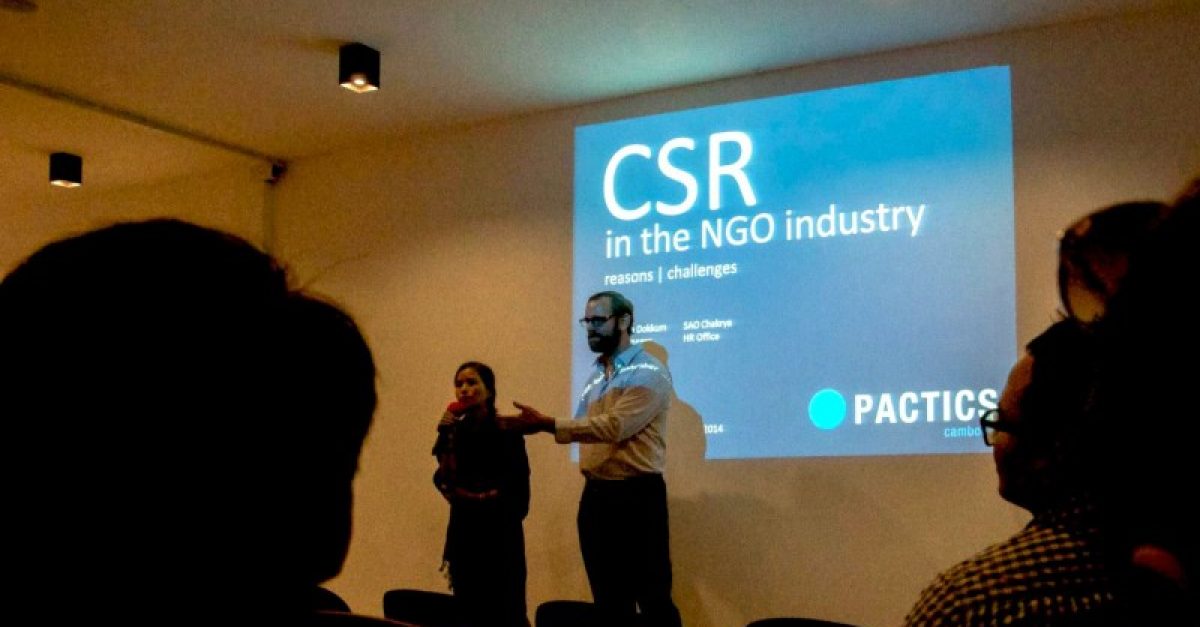Collaboration Cambodia started in 2011 as a way to bring people together from Siem Reap province to eat, meet, and share discourse. On the first Sunday of every month, Siem Reap’s NGO Network hosts two speakers and an open forum to discuss relevant news and upcoming events. This incredible forum is free and open to anyone interested in topics like facilitating skills using creative art techniques, nutrition education intervention, and Cambodian startups.
Each month Collaboration Cambodia is held at a different space in town
We were honored to speak at this month’s event – held at 1961, a wonderful new coworking and creative space on the river. The event was catered by Brown Rice Restaurant on Street 26, feeding more than 50 NGO workers, teachers, students and business owners – both foreign and Cambodian.
Social Work In Cambodia
Mr. Sorn Sokchea from Angkor Hospital for Children (AHC) gave a moving speech on the topic of Social Work in Cambodia. He noted that AHC has just five social workers to see between 500-700 patients each day – free of charge – with cases ranging from cleft palates to malnutrition and terminal illness. AHC is an incredible organization doing immeasurable good for Siem Reap province.
Corporate Social Responsibility
Ms. Chakrya and Mr. Jack of Pactics, both with NGO backgrounds, took the floor at 1961 to speak – in both English and Khmer – on one of our favorite topics: Corporate Social Responsibility (CSR).
To warm up the audience, Chakrya tested their knowledge of labor laws in Cambodia.
Do you know how many toilets are required for 20 staff members? Do you know the minimum number of staff a company can hire before they are required to hire a nurse? Or how many hours of paid overtime you can work in Cambodia per week? Pactics knows.
We know there is a difference between laws for NGOs and for factories. The laws for factories are stricter than those for NGOs, and those are the laws we choose to follow when we opened Pactics in Siem Reap. When Pactics’ owner bought the first factory in Shanghai it was poorly run. As complications with migrant workers increased in China, with little help from the government, Pactics sought out a location for a second factory that could be designed from the ground up.
We are lucky – Jack smiles. We have one owner and, thankfully, he believes that CSR is important.
Of Pactics’ 45 million products yearly, 30-35 million are made in our new factory in Cambodia.
Why should foreign companies in Cambodia consider CSR? “Simple. Human decency. If our factory was in Holland we would do the same thing.”
Philanthropy and an Awareness of Risk Management
Corporate Social Responsibility promotes philanthropy and an awareness of risk management. These things all increase the value of the company, which is any business’s primary goal, but Chakrya believes it is even simpler than that.
Basically, we take care of our employees, and take care of the overall impact Pactics has on people and the planet, Chakrya explains
CSR is woven into the whole management system and everybody has a responsibility to it. Pactics wants to have shared values with their community and integrate the business into the community. Chakrya shrugs, “We just want to do it because we think it’s good.”
Challenges In Cambodia
There are, of course, challenges to opening a business in Cambodia, like finding technically skilled workers and sourcing electricity to the factory, just outside the city center behind the Cultural Village. So one woman in the audience asked: Why Cambodia? Cambodia has special trade relations with the United States and Europe, a very new (1997) labor law that meets international standards, and, as Jack so eloquently put it: “Cambodia is a nice country.”
This slideshow requires JavaScript.






